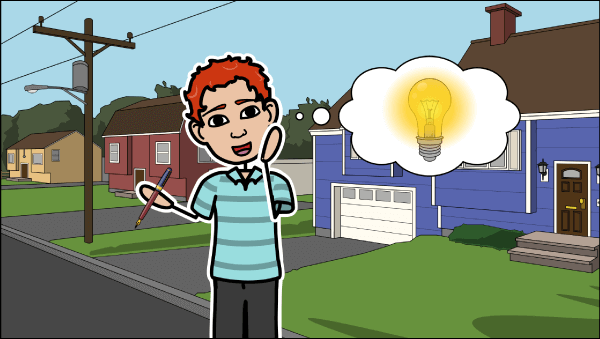Studentenactiviteiten voor Frindle
A Quick Frindle Summary (Contains Plot Spoilers)
Nick Allen is a unique fifth grade student at Lincoln Elementary. Nick isn’t necessarily a troublemaker, but he is full of wild ideas and is daring enough to try them out no matter what the consequences. As Nick begins fifth grade, he knows things will be tough in Mrs. Granger’s class. Everyone knows she has X-ray vision, worships the dictionary, and has the longest weekly vocabulary list.
On the first day in Mrs. Granger’s class, Nick decides to pull a classic move to kill time and asks a lofty question about where all words come from. Mrs. Granger won’t be manipulated so easily, and she assigns him an oral report on the dictionary and the origin of words. As Nick reluctantly completes his report, an idea begins to form. What if he could create a new word?
Soon, Nick’s new word, “frindle”, has completely replaced the word “pen” in his classroom. Mrs. Granger thinks this disrespects the history of the word pen, and she won’t allow it. She even keeps students in for detention daily to try to thwart the rapidly growing popularity of the new word.
Mrs. Granger’s reaction only makes the word’s power stronger, and the quirky story of the boy who created a word gains national attention. After a visit from the principal to Nick’s house, Nick realizes that even if he wanted to, he can’t stop the word from spreading. It is out of his hands. He appears on national news, and merchandise is being created to make money off of the new word. A trust is even set up in Nick’s name for some of the profits from the popular frindle merchandise made by one of Mr. Allen’s longtime friends.
Unfortunately, Nick’s creativity and spontaneity is affected by his word’s success. As he nears the end of fifth grade, he isn’t sure if he wants his ideas to spread anymore, so he stops trying them out. Even Mrs. Granger notices that he has lost some of his spark. She encourages him to keep on dreaming up ideas. Nick takes Mrs. Granger’s words to heart and slowly returns to his normal self.
The book concludes by flashing forward ten years to a successful Nick Allen, who becomes quite wealthy with his frindle trust fund. He receives an unexpected package from Mrs. Granger with the note she wrote to him ten years ago and a new dictionary – updated to officially include the word frindle. He also receives her favorite ballpoint pen, engraved with the word frindle. Nick realizes that Mrs. Granger was rooting for him and his word the whole time and she played an important role in his success.
In a final heartwarming touch, Mrs. Granger receives her own surprise: a college scholarship in her name, paid for with frindle money, and her own engraved pen that reads, “This object belongs to Mrs. Lorelei Granger and she may call it any name she chooses.”
Essential Questions For Frindle
- What is creativity?
- How can small ideas change the world?
- Should Nick get in trouble for creating the word “frindle”?
- Why is imagination important?
How Tos over Frindle door Andrew Clements
Betrek leerlingen bij creatieve woordvernieuwing met een Frindle-geïnspireerde klasactiviteit
Moedig je klas aan om hun eigen woorden te verzinnen, net zoals Nick deed in Frindle. Deze activiteit stimuleert creativiteit en helpt leerlingen te begrijpen hoe taal evolueert op een leuke en gedenkwaardige manier.
Brainstorm samen over nieuwe fantasierijke woorden
Leid een groepsdiscussie waarin de leerlingen ideeën delen voor objecten of acties zonder namen. Nodig iedereen uit om speelse, nuttige of grappige woorden voor deze items voor te stellen. Vier elke suggestie om zelfvertrouwen op te bouwen.
Help leerlingen hun uitgevonden woorden te definiëren en te gebruiken
Vraag elke leerling of groep om een definitie en een voorbeeldzin te schrijven met hun nieuwe woord. Dit helpt hen na te denken over betekenis en context terwijl ze vocabulaire oefenen.
Maak een klaswoordenboek voor uitgevonden woorden
Verzamel alle woorden van de leerlingen in een klaswoordenboek. Toon het op een prikbord of deel het digitaal zodat iedereen de nieuwe woorden kan zien en gebruiken. Dit bevordert een gevoel van eigenaarschap en trots in hun creaties.
Vier en verwerk nieuwe woorden in het dagelijks klasleven
Moedig leerlingen aan om de uitgevonden woorden te gebruiken in gesprekken, verhalen of opdrachten gedurende een week. Bied kleine beloningen of complimenten wanneer je ze hoort hun inventieve woordenschat te gebruiken. Door het leuk te maken, versterk je het leren.
Veelgestelde vragen over Frindle door Andrew Clements
What are some quick lesson ideas for teaching Frindle in the classroom?
Explore Frindle with activities like vocabulary challenges, persuasive writing assignments, character trait analysis, and debates about creativity. Engage students by having them invent their own words and discuss how language evolves.
How can I use Frindle to teach creativity and innovation to elementary students?
Use Frindle to spark conversations about creativity. Have students brainstorm new words, discuss how small ideas can have big impacts, and reflect on Nick's journey as an example of thinking outside the box.
What grade levels is Frindle most suitable for?
Frindle is ideal for students in Grades 3–6. The themes, humor, and relatable characters make it engaging for upper elementary and early middle school readers.
Why is Frindle a good choice for teaching about the power of words?
Frindle illustrates how words gain meaning and how language can influence culture. It helps students understand the importance of communication and the impact one idea can have on a community.
What are the main themes in Frindle by Andrew Clements?
The main themes in Frindle include creativity, the power of ideas, imagination, and how small actions can create big changes. The story also explores the relationship between students and teachers.
© 2026 - Clever Prototypes, LLC - Alle rechten voorbehouden.
StoryboardThat is een handelsmerk van Clever Prototypes , LLC , en geregistreerd bij het US Patent and Trademark Office




